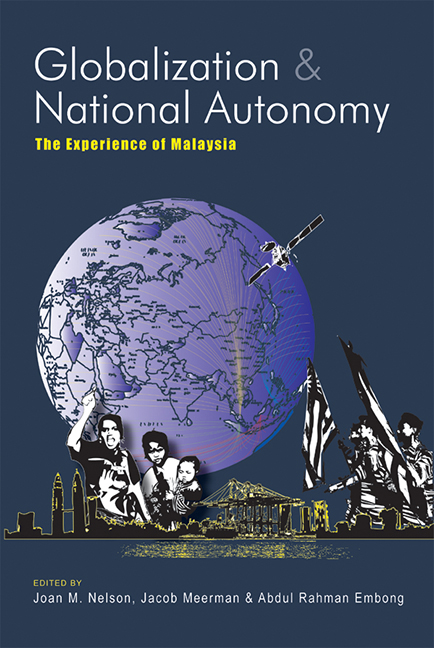Book contents
- Frontmatter
- Contents
- List of Abbreviations
- List of Tables and Figures
- Preface
- Contributors
- Chapter 1 Introduction
- Chapter 2 Developmentalist State in Malaysia: Its Origins, Nature, and Contemporary Transformation
- Chapter 3 The Look East Policy, the Asian Crisis, and State Autonomy
- Chapter 4 The Malaysian Success Story, the Public Sector, and Inter-ethnic Inequality
- Chapter 5 Poverty Eradication, Development, and Policy Space in Malaysia
- Chapter 6 Trade Liberalization and National Autonomy: Malaysia's Experience at the Multilateral and Bilateral Levels
- Chapter 7 Malaysia's Education Policies: Balancing Multiple Goals and Global Pressures
- Chapter 8 Malaysia's Healthcare Sector: Shifting Roles for Public and Private Provision
- Chapter 9 Globalization, Islamic Resurgence, and State Autonomy: The Response of the Malaysian State to ‘Islamic Globalization’
- Chapter 10 The National Culture Policy and Contestation over Malaysian Identity
- Chapter 11 Conclusions
- Index
Chapter 6 - Trade Liberalization and National Autonomy: Malaysia's Experience at the Multilateral and Bilateral Levels
Published online by Cambridge University Press: 21 October 2015
- Frontmatter
- Contents
- List of Abbreviations
- List of Tables and Figures
- Preface
- Contributors
- Chapter 1 Introduction
- Chapter 2 Developmentalist State in Malaysia: Its Origins, Nature, and Contemporary Transformation
- Chapter 3 The Look East Policy, the Asian Crisis, and State Autonomy
- Chapter 4 The Malaysian Success Story, the Public Sector, and Inter-ethnic Inequality
- Chapter 5 Poverty Eradication, Development, and Policy Space in Malaysia
- Chapter 6 Trade Liberalization and National Autonomy: Malaysia's Experience at the Multilateral and Bilateral Levels
- Chapter 7 Malaysia's Education Policies: Balancing Multiple Goals and Global Pressures
- Chapter 8 Malaysia's Healthcare Sector: Shifting Roles for Public and Private Provision
- Chapter 9 Globalization, Islamic Resurgence, and State Autonomy: The Response of the Malaysian State to ‘Islamic Globalization’
- Chapter 10 The National Culture Policy and Contestation over Malaysian Identity
- Chapter 11 Conclusions
- Index
Summary
INTRODUCTION
Progressive and selective trade liberalization over time has enabled international trade to become a key component of the Malaysian economy. Malaysia in fact took advantage of economic globalization in the electrical and electronics sector by creating free trade zones in the early 1970s. This provided a liberal environment for multinational companies and gave Malaysia a headstart in the region's integration into the production networks that subsequently evolved with a high degree of multinational participation in the ASEAN economies. Exports and imports as a percentage of Gross Domestic Product (GDP) of Malaysia thus grew from 55 per cent and 42 per cent in 1960 to 107.9 per cent and 87.8 per cent respectively in 2005.
Malaysia's relatively open and outward looking trade and investment policies coincided with the global trend in trade liberalization, beginning with tariff reduction following the establishment of the General Agreement of Tariffs and Trade (GATT) in 1957. The conclusion of the Uruguay Round negotiations in 1994 and the establishment of the World Trade Organization (WTO) in January 1995 introduced three new dimensions at the multilateral level. First, unlike the GATT, the WTO is a full-fledged international organization with a binding dispute settlement mechanism. Second, WTO has an expanded mandate and membership, of which the majority is the developing and transition economies. Third, WTO agreements provide for review within five years of ratification, thereby introducing a dynamic element in the construction and enforcement of rules for the conduct of international trade.
The expanded mandate has led to major agreements ratified during the Uruguay Round that address non-tariff barriers, dumping and subsidies, trade related investment measures, intellectual property rights and government procurement. The inclusion of economic rules in the WTO agreements has changed the face of trade liberalization from the mere removal of cross border trade barriers alone.
- Type
- Chapter
- Information
- Globalization and National AutonomyThe Experience of Malaysia, pp. 159 - 188Publisher: ISEAS–Yusof Ishak InstitutePrint publication year: 2008

